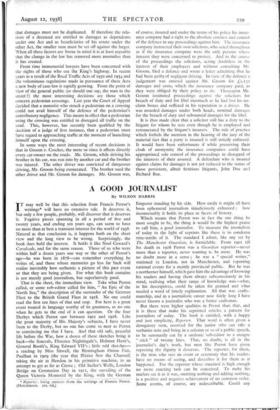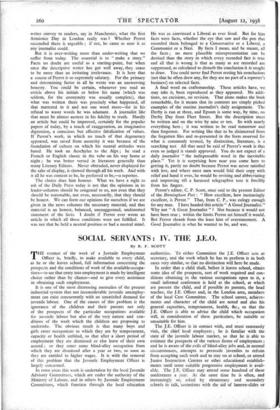A GOOD JOURNALIST
By WILSON HARRIS
IT may well be that this selection from Francis Perrot's writings* will have no extensive sale. It deserves it, but only a few people, probably, will discover that it deserves it. Fugitive pieces spanning in all a period of five and twenty years, and ending ten years ago, can seem to have no more than at best a transient interest for the world of 1938. Natural as that conclusion is, it happens both on the short view and the long view to be wrong. Surprisingly, the book does hold the interest. It holds it like Noel Coward's Cavalcade, and for the same reason. Those of us who were within half a dozen years one way or the other of Perrot's age—he was born in 1878—can remember everything he writes of, and those whose memories go less far back will realise inevitably how authentic a picture of this past event or that they are being given. For what this book contains is not merely good journalism, but superlatively good.
That is the short, the immediate view. Take what Perrot called, or some sub-editor called for him, " An Epic of the North Sea," the description of the surrender of the German Fleet to the British Grand Fleet in 1918. No one could read the first ten lines of that and stop. For here is a great event treated in language worthy of its greatness, as no one when he gets to the end of it can question. Or the four Derbys which Perrot saw between 1921 and 1928. Like the great majority of His Majesty's subjects, I have never been to the Derby, but no one has come so near as Perrot to convincing me that I have. And that old safe, peaceful life before the War, how a dozen of these sketches bring it back—the funerals, Florence Nightingale's, Holman Hunt's, General Booth's, King Edward VII's ; little odd sketches— a reading by Miss Sitwell, the Birmingham Onion Fair, Paulhan in 1909 (the year that Bleriot flew the Channel) taking the air at Hendon in his primitive machine, in an attempt to get as far as Crewe ; Old Sadler's Wells, London Bridge on Coronation Day in 1911, the unveiling of the Queen Victoria Memorial by the King, with the German * Reporter: being extracts from the writings of Francis Perrot. (Hutchinson. IOS. 6d.) Emperor standing by his side. How easily it might all have been ephemeral journalism injudiciously exhumed ; how incontestably it holds its place as facets of history.
Which means that Perrot was in fact the one thing he most sought to be, the thing it would be the highest praise to call him, a good journalist. To measure the journalism of today in the light of reprints like these is to condemn nine-tenths of it. The standard I admit, like any set by The Manchester Guardian, is formidable. From 1901 till his death in 1928 Perrot was a Guardian reporter—never more than a reporter, never wanting to be more. He was no doubt more in a sense ; he was a " special writer," stationed in London, not in Manchester, and reporting national events for a mainly provincial public. But he was a northerner himself, which gave him the advantage of knowing his readers and having them always subconsciously in his mind, realising what their range of knowledge was—what, in his descriptives, could be taken for granted and what needed a word of timely explanation. All that was crafts- manship, and in a journalistic career now fairly long I have never known a journalist who was a better craftsman.
But there were higher qualities in Perrot than that, and it is these that make his reprinted articles a pattern for journalists of today. The book is entitled, with a happy and just simplicity, Reporter. That word is often given a derogatory turn, reserved for the junior who can take a verbatim note and bring in a column or so of a public speech, to be summarily cut by a sardonic sub-editor to a meagre " stick " of twenty lines. That, no doubt, is all in the journalist's day's work, but men like Perrot have given reporting the dignity it deserves. The reporter, for them, is the man who sees an event or ceremony that his readers have no means of seeing, and describes it for them as it happened. For the reporter whose standard is high enough no more exacting task can be conceived. To make his readers see it as it was, omitting nothing and adding nothing, is a positive and negative achievement of no common order. Some events, of course, are indescribable. Could any writer convey to readers, say in Manchester, what the first Armistice Day in London really was ? Whether Perrot succeeded there is arguable ; if not, he came as near it as any journalist could.
But it is over-writing more than under-writing that we suffer from today. The essential is to " make a story." Facts no doubt are useful as a starting-point, but when once the descriptive writer has got well away, they cease to be more than an irritating irrelevance. It is here that a course of Perrot is so supremely salutary. For the primary and determining factor in all he wrote was an unswerving honesty. You could be certain, whenever you read an article above his initials or below his name (which was seldom, for the anonymity was usually complete), that what was written there was precisely what happened, all that mattered in it and not one word more—for in his refusal to waste words he was adamant. A journalist like that must be almost austere in his fidelity to truth. Hardly an article but could be improved, certainly for the popular papers of today, by a touch of exaggeration, an imaginative digression, a conscious but effective falsification of values. If Perrot's work, in which no touch of that degeneracy appeared, was saved from austerity it was because of the foundation of culture on which his mental attitudes were based. He took an Aeschylus to the Alps ; he read a French or English classic in the tube on his way home at night ; he was better versed in literature generally than many Literary Editors. Never obtruded, never displayed for the sake of display, it showed through all his work. And with it all he was content to be, he preferred to be,—a reporter.
The choice does him honour. What we have a right to ask of the Daily Press today is not that the opinions in its leader-columns should be congenial to us, not even that they should be reasonable, not even, necessarily, that they should be honest. We can form our opinions for ourselves if we are given in the news columns the necessary material, and that material is an honest, balanced, unexaggerated, undistorted statement of the facts. I doubt if Perrot ever wrote an article in which all those conditions were not fulfilled. It was not that he held a neutral position or had a neutral mind. He was as convinced a Liberal as ever lived. But for him facts were facts, whether the eye that saw and the pen that recorded them belonged to a Conservative or a Liberal, a Communist or a Nazi. By facts I mean, and he meant, all the facts ; no more plausible misrepresentation can be devised than the story in which every recorded fact is true and all that is wrong is that as many as are recorded are suppressed, as calculated to disturb the conclusion it is sought to draw. You could never find Perrot resting his conclusions (not that he often drew any, for they are no part of a reporter's business) on selected facts.
A final word on craftsmanship. These articles have, we may take it, been reproduced as they appeared. No addi- tions, no excisions, no revision. That alone makes the book remarkable, for it means that its contents are simply picked examples of the routine journalist's daily assignment. The Derby is run at three, and Epsom is some way, by time, on Derby Day from Fleet Street. But the description must be written and on the wire by nine or ten. So with nearly everything here ; it was written to be read tomorrow and then forgotten. For writing like that to be disinterred from the forgotten files and re-presented in the form reserved for what is commonly termed, by distinetion, literature, is a searching test. All that need be said of Perrot's work is that even so judged it stands approved. You do not expect of a daily journalist " the indispensable word in the inevitable place." Yet it is surprising how near you come here to getting it, partly no doubt because Perrot was never satisfied with less, and where most men would fold their copy with relief and hand it over, he would be revising and abbreviating and improving till a harassed telegraphist tore it forcibly from his fingers.
Perrot's editor, C. P. Scott, once said to the present Editor of the Birmingham Post : " How excellent, how increasingly excellent; is Perrot." That, from C. P., was .eulogy enough for any man. I have headed this article" A Good Journalist." Why not " A Great Journalist " ? Not because it would not have been true ; within the limits Perrot set himself it would. But Perrot shrank from the least hint of overstatement. A Good Journalist is what he wanted to be, and was.







































 Previous page
Previous page